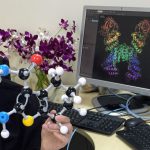The Covid-19 pandemic has drawn attention to the basics of developing immunity through good nutrition, by making the right food choice. Protein, some types of fat, minerals, vitamins, probiotics and prebiotics have a major role to improve immunity. So how do we generate new knowledge in this area? Is there a relationship between nutrition and immunity? Is immunity compromised only in sick individuals? Or is it observed among other groups of populations too? To answer these questions, Seah Sheng Hong (aka Shawn), Audrey Meno Cleo and Chen Wei Mun, undergraduate BSc (Hons) in Nutrition students at IMU undertook a research project on athletes. They studied the effect of probiotics and omega 3 – fatty acids derived from fish, on athletes who are undergoing rigorous training. Seah Sheng Hong, opines: “I learnt about the importance of prebiotic and probiotics for gut health contributing to a strong immune system in lectures. But these concepts came alive when we did the research” Dr Sangeetha Shyam, Dr Megan Chong and Dr Tan Seok Shin from the International Medical University and Dr Mahenderan Appukutty, a Sport Science collaborator from Universiti Teknologi Mara (UiTM) were the team who designed this study. The team was interested to see if taking a specific strain probiotic supplement decreased the number of colds and stomach upsets that the athletes had in a week. Dr Sangeetha says, “The probiotics are small organisms that do big work. Once they reach your colon, they along with some of the chemicals that they produce, reduce inflammation and communicate with your immune system and improve it. Consuming fish oil in addition, can theoretically improve the way the probiotics stick to your colon and flourish and be more effective. So, your gut more does than just digests and absorbs your food!” Dr Megan adds in that “The improvement in immunity can be measured by looking at the number of immune cells you have in a blood test or even looking at the proteins in your saliva. Practically we can see if they fall sick less as the coaches would like to see them attending all their practice sessions. The athletes will be rewarded through improved performance.”

Students of Nutrition in IMU are trained to appreciate the multi-faceted role of nutrients. This knowledge contributes to development of Recommended Nutrient Intakes (RNI) for populations in a specific country. The RNI is like a prescription of the amount of energy and different nutrients that you should eat to suit your age, gender and lifestyle. As a nutritionist, they plan simple balanced meals that can help to achieve the desired nutrients within client’s budget, taste preference and cultural sensitivity. Shawn has a twinkle in his eyes when he privately says “I can’t forget the hard work that went with recruiting athletes and collecting biological samples. And because I was creating new knowledge, I have a good grasp of how nutrients work”
| About IMU’s Nutrition Programme and its Collaboration with Deakin University |
|---|
| The 3-year Nutrition programme from IMU equips students to pursue careers in various fields including industry, education, health promotion, research and journalism. The curriculum accords strong emphasis not only on core nutrition modules, but also on key profession-supporting modules such as nutritional status assessment, diet-related non-communicable diseases, monitoring and evaluation of programmes, communication and marketing management. IMU’s Nutrition programme provides students with a rigorous experience in research methodology and application for each stage of the research process and data management. Students will have the opportunity to showcase their completed research in scientific conferences and journals. For this programme, the IMU is proud to collaborate with Deakin University in Australia. With this collaboration, nutrition students have the opportunity to study the first two years of their degree at IMU and then transfer to Deakin University for completion of their degree. Upon completion of the degree, these students will then receive a Bachelor of Nutrition Science from Deakin University. This partnership is a testament to the excellence of the IMU’s Nutrition programme which is benchmarked to international standards. |









